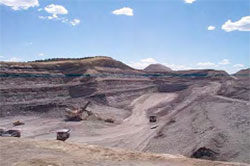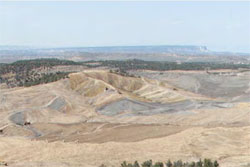Natural Regrade’s innovative GeoFluv™ fluvial geomorphic landform design method will be taught in two courses: “Design and Construction of Topography in Ecological Restoration” and “Environmental Impact Assessment and Remediation.” Both will be led by Jose Francisco Martin Duque, who has done pioneering work in geomorphic landform design in Spain.
While used extensively by mining companies, Carlson Natural Regrade gives all faced with disturbed lands an affordable and natural way to achieve sustainability. The software features the GeoFluv approach to stable landform design, using fluvial geomorphic principles – essentially designing the land to be as it would have naturally formed on that site over thousands of years. With Carlson Natural Regrade, the natural beauty of the reclaimed land is returned, while stability against erosion is established and the water quality remains comparable or better than surrounding undisturbed lands.
Both Martin Duque and his colleague in Ecological Restoration, José Manuel Nicolau Ibarra, who is at the University of Zaragoza (Campus de Huesca), see many applications beyond mined land reclamation for Natural Regrade, including wetlands restoration and sediment control from highway projects.
“We have been asked to find alternative methods to minimize erosion and sedimentation from highway road cuts,” says Martin Duque, “and the design speed offered by the Natural Regrade software will help us find stable, economical alternatives that are in harmony with natural processes; this is the key to sustainability in ecological restoration.”
The universities have students engaged in sedimentation studies on disturbed lands to document the effectiveness of fluvial geomorphic designs as compared with traditional designs that are characterized by constant-gradient slopes, terraces and down-drains. Martin Duque and Nicolau Ibarra intend to use these kinds of studies to verify the effectiveness of the GeoFluv method as used in Natural Regrade.
Martin Duque has shown that slope profiles that are made according to fluvial geomorphic principles, mimicking natural slopes, provide a low-cost means to stabilize steep disturbed slopes against erosive forces. His work has recognized the need to combine the upland slopes with an integrated drainage network.
“This integrated upland and drainage network is exactly what the GeoFluv method provides and the Natural Regrade design software greatly simplifies the making of these complex designs,” says Martin Duque. There are annually more than 800 students from Europe and South America applying for the 35 seats in the Ecological Restoration Master class. Those enrolled in January 2010 will be the first to learn to use the GeoFluv method with Natural Regrade.
Nicholas Bugosh, developer of the GeoFluv method and GeoFluv Technical Director for Carlson Software, recently gave a lecture at the University Complutense entitled, “The Landform is the Foundation of Ecological Restoration, (How the new GeoFluv landform design method promotes sustainability).”
Students and interested university lecturers and industrial developers attended the event, which was sponsored by the Ecological Restoration postgraduate program and the Faculty of Geology of the Complutense University.
For more information about Carlson Natural Regrade and GeoFluv, a new technology for stable landform design, contact Bugosh directly at nbugosh@carlsonsw.com or 970.631.4190.
About Carlson Software.
Founded in 1983, Carlson Software develops technically advanced software solutions to bring land development professionals from concept to completion. The independent, privately owned company produces comprehensive civil, surveying, machine control and positioning, mining, and law enforcement investigative software solutions. Its free technical support and dedication to customer service is unique in the industry. Carlson Software is headquartered in Maysville, Ky., with branch offices in Boston and Queensland, Australia.




